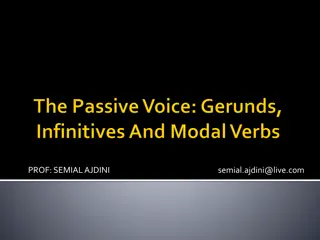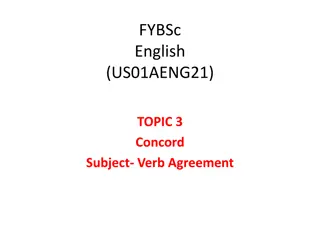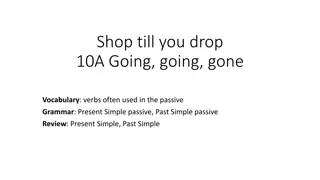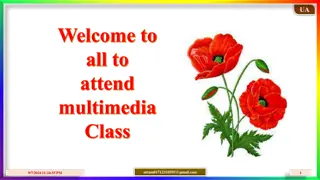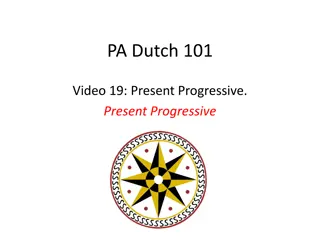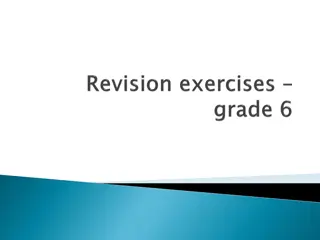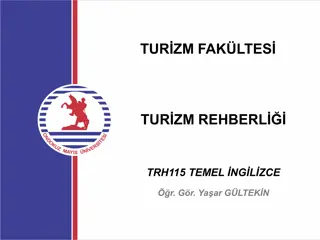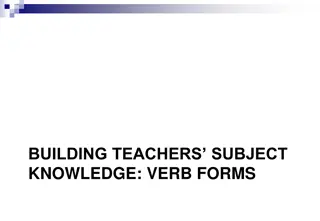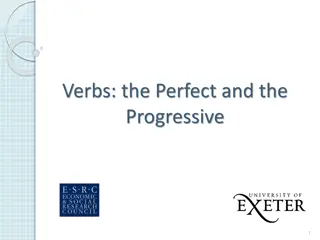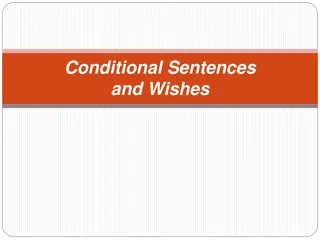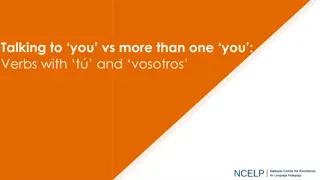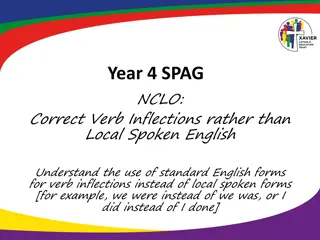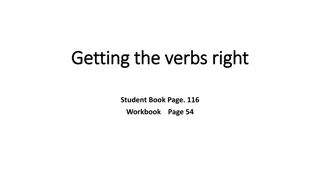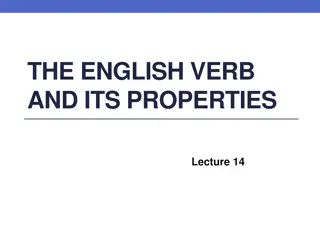Understanding Verb Forms: Simple, Progressive, and Emphatic
English verbs have three forms: simple, progressive, and emphatic. The progressive form consists of a form of "to be" followed by the -ing form of the verb. While some may consider progressive forms as separate tenses, they mainly reflect aspects rather than time differences. Excerpts from "Twilight" are analyzed to identify progressive form verbs correctly.
Download Presentation

Please find below an Image/Link to download the presentation.
The content on the website is provided AS IS for your information and personal use only. It may not be sold, licensed, or shared on other websites without obtaining consent from the author. Download presentation by click this link. If you encounter any issues during the download, it is possible that the publisher has removed the file from their server.
E N D
Presentation Transcript
Verb Usage Form, Voice, Mood
Theres a bit more to know about verbs in addition to tense. Lets start with form. English verbs have 3 forms: simple, progressive, emphatic. Progressive has a form of to be + the ing form (called the present participle ) of the verb: I am reading We were helping He is listening They are watching If you google tenses, you will find that some people say that English has 12 tenses, because they consider the progressive form verbs to be tenses. This doesn t make much sense, because there is really no time difference between, for example, the simple past & the past progressive: Yesterday I ate lunch at noon Yesterday I was eating lunch at noon. This is a difference of ASPECT, a difference we talked about in the previous presentation regarding the difference between the past tense & the present perfect.
simple progressive I eat I ate I will eat I have eaten I had eaten I will have eaten I am eating I was eating I will be eating I have been eating I had been eating I will have been eating
Identify the progressive form verbs in the following excerpt from Twilight. Warning: not all verbs that end with ing are progressive form verbs. In order to be a progressive, it must be preceded by a form of to be (is, are, was, were, be, being, been, am). My mother drove me to the airport with the windows rolled down. It was seventy-five degrees in Phoenix, the sky a perfect, cloudless blue. I was wearing my favorite shirt sleeveless, white eyelet lace; I was wearing it as a farewell gesture. My carry-on item was a parka . It was to Forks that I now exiled myself an action that I took with great horror. I detested Forks. I loved Phoenix. I loved the sun and the blistering heat. I loved the vigorous, sprawling city. When I landed in Port Angeles, it was raining. I didn t see it as an omen just unavoidable. I d already said my goodbyes to the sun. Charlie was waiting for me with the cruiser. This I was expecting, too. Charlie is Police Chief Swan to the good people of Forks. My primary motivation behind buying a car, despite the scarcity of my funds, was that I refused to be driven around town in a car with red and blue lights on top. Nothing slows down traffic like a cop. Charlie gave me an awkward, one-armed hug when I stumbled my way off the plane. It s good to see you, Bells, he said, smiling as he automatically caught and steadied me. You haven t changed much. How s Ren e?
My mother drove me to the airport with the windows rolled down. It was seventy- five degrees in Phoenix, the sky a perfect, cloudless blue. I was wearing my favorite shirt sleeveless, white eyelet lace; I was wearing it as a farewell gesture. My carry-on item was a parka . It was to Forks that I now exiled myself an action that I took with great horror. I detested Forks. I loved Phoenix. I loved the sun and the blistering heat. I loved the vigorous, sprawling city. When I landed in Port Angeles, it was raining. I didn t see it as an omen just unavoidable. I d already said my goodbyes to the sun. Charlie was waiting for me with the cruiser. This I was expecting, too. Charlie is Police Chief Swan to the good people of Forks. My primary motivation behind buying a car, despite the scarcity of my funds, was that I refused to be driven around town in a car with red and blue lights on top. Nothing slows down traffic like a cop. Charlie gave me an awkward, one-armed hug when I stumbled my way off the plane. It s good to see you, Bells, he said, smiling as he automatically caught and steadied me. You haven t changed much. How s Ren e?
The second form is the emphatic form. Thats when we use do, does, or did + infinitive (- to) for emphasis: I do believe you. simple emphatic I eat broccoli. I ate broccoli. I do eat broccoli. I did eat broccoli. While you can use the progressive form in all 6 tenses, you can use the emphatic form only with the present & past, as above. We can t say, I do will eat or I do have eaten.
You may have figured out the third form: simple. The progressive is to be + -ing; the emphatic is do/does/did + infinitive (- to ); and the simple is everything else. simple I sing I sang I will sing I have sung I had sung I will have sung I will have been singing progressive I am singing I was singing I will be singing I have been singing I had been singing emphatic I do sing I did sing
Voice There are 2 different voices in English: active & passive. Voice has to do with the relationship between the subject & the verb. ACTIVE voice means that the subject is doing the action: Carlos sneezed. Elizabeth bought a cat. Thomas read the book. PASSIVE voice means that something happens to the subject: The cat was bought by Elizabeth. Tom was struck by a car. The candy was sold for $5.00 a pound. Note that a passive voice verb ALWAYS has a form of to be + past participle. It can be in any tense: Cars are sold every day here. Cars were sold every day here. Cars will be sold every day here. Cars have been sold every day here. Cars had been sold every day here. Cars will have been sold every day here.
Chances are great that a professor has marked a passive voice verb on one of your papers. Passive voice is considered a weak form of writing. Why say, The cat was bought by Elizabeth when you can say, Elizabeth bought the cat So when you reread & edit your papers, you need to look for passive voice verbs & see if you can change them to active voice. There are some where it just isn t natural: The Old Testament was written before the birth of Christ. How would you put that in active voice? That would be tough, because the Old Testament had about 50 authors. In general, if the person who would be the subject just isn t important, passive voice is OK: I am very happy that my entire pie was eaten at the picnic. Look at the mosquito bites on that child s arms! How many times was she bitten? Now, we can put those sentences into the active voice if we absolutely have to, but it would be an effort to make them sound natural: I am very happy that the people at the picnic ate all my pie. How many times did mosquitos bite the child s arms? That s definitely not how we talk about mosquito bites, & the other sentence sounds more natural in the passive voice as well. But if you have a professor who absolutely refuses to let you have ANY passive voice verbs, you need to know how to change it to active voice.
Identify all the passive voice verbs in this excerpt from Harry Potter & the Chamber of Secrets. The excerpt has a lot of phrases & clauses, so be sure you match the subject with the correct verb. This may take a little more time & thought than you ve spent identifying other items in previous exercises. Don t give this just a passing glance. While passive voice isn t the most important grammar item, you need to be able to recognize it. October arrived, spreading a damp chill over the grounds and into the castle. Madam Pomfrey, the nurse, was kept busy by a sudden spate of colds among the staff and students. Her Pepperup potion worked instantly, though it left the drinker smoking at the ears for several hours afterward. Ginny Weasley, who had been looking pale, was bullied into taking some by Percy. The steam pouring from under her vivid hair gave the impression that her whole head was on fire. Raindrops the size of bullets thundered on the castle windows for days on end; the lake rose, the flower beds turned into muddy streams, and Hagrid's pumpkins swelled to the size of garden sheds. Oliver Wood's enthusiasm for regular training sessions, however, was not dampened, which was why Harry was to be found, late one stormy Saturday afternoon a few days before Halloween, returning to Gryffindor Tower, drenched to the skin and splattered with mud. Even aside from the rain and wind it hadn't been a happy practice session. Fred and George, who had been spying on the Slytherin team, had seen for themselves the speed of those new Nimbus Two Thousand and Ones. They reported that the Slytherin team was no more than seven greenish blurs, shooting through the air like missiles.
October arrived, spreading a damp chill over the grounds and into the castle. Madam Pomfrey, the nurse, was kept busy by a sudden spate of colds among the staff and students. Her Pepperup potion worked instantly, though it left the drinker smoking at the ears for several hours afterward. Ginny Weasley, who had been looking pale, was bullied into taking some by Percy. The steam pouring from under her vivid hair gave the impression that her whole head was on fire. Raindrops the size of bullets thundered on the castle windows for days on end; the lake rose, the flower beds turned into muddy streams, and Hagrid's pumpkins swelled to the size of garden sheds. Oliver Wood's enthusiasm for regular training sessions, however, was not dampened, which was why Harry was to be found, late one stormy Saturday afternoon a few days before Halloween, returning to Gryffindor Tower, drenched to the skin and splattered with mud. Even aside from the rain and wind it hadn't been a happy practice session. Fred and George, who had been spying on the Slytherin team, had seen for themselves the speed of those new Nimbus Two Thousand and Ones. They reported that the Slytherin team was no more than seven greenish blurs, shooting through the air like missiles. This phrase may have tripped you up. Harry was found would be passive voice; however, since what follows was is an infinitive, not a past participle, it s not passive voice. If you misidentified anything else, check for both a form of to be (is, are, was, were, be, being, been, am) + a past participle (have BROKEN, have EATEN, have SEEN, etc.).
Mood Mood shows the speaker s attitude about what he s saying. That s clear, right? Let s look at the three moods. Two will be very easy for you. The imperative mood is commands: Sit down. Eat your lunch. Turn right at the corner. Those are easy for us to recognize. We re giving instructions, & the subject is an understood you : (You) sit down! The indicative mood is the default mood. That is, if it s not imperative & not subjunctive (the third mood), it s indicative. The vast majority of verbs you use & hear are indicative. Until this slide, where you see examples of the imperative mood, every verb in this presentation was indicative mood. In fact, it s a pretty safe bet that every verb in this entire grammar series thus far has been in the indicative or the imperative (where you were given instructions to do something) mood, with no verbs at all in the subjunctive mood.
Now for the illusive subjunctive mood. First of all, its used in contrary-to-fact clauses: If I were you (but I m not), I d take the job. If it were raining (but it s not), we d stay home. Contrast that with other if statements where we don t know if the condition is true or not: If it s raining (I don t know if it is), they ll cancel the game. If you re the teacher (I don t know if you are), I need you to sign this. The subjunctive is also used when someone is trying to influence something or someone else: I suggest he study (not studies) more. I move that the meeting be (not is) adjourned. When you use it with an if, you use were ; when you use it to show someone trying to use influence, you use the infinitive (minus) to. It s good to recognize the subjunctive & be familiar with it. But it s been fading from use for years. Still, using were in contrary-to-fact clauses is something educated people do, & of course, I move that the meeting be adjourned, is regularly used in business meetings.
Identify the verbs tense, form, mood, & voice. The boy has eaten all his vegetables. Tense? Present perfect Form? Simple Mood? Indicative Voice? Active The kids were singing a familiar song. Tense? Past Form? Progressive Mood? Indicative Voice? Active
The pizza will be baked in a stone oven. Tense? future Form? simple Mood? indicative Voice? passive Do your homework before midnight. Tense? present Form? simple (Don t be fooled by the word do ; here it s the MAIN verb.) Mood? imperative Voice? active
He did see his girlfriends parents. Tense? past Form? emphatic Mood? indicative Voice? active Every bite of that cake will have been eaten by the time the guests leave. Tense? future perfect ( Will makes it future; have + been which is the past participle of to be make it perfect.) Form? simple Mood? indicative Voice? passive
I always insist that my son clean his room. Tense? present Form? simple Mood? subjunctive Voice? active The children had been making sugar cookies. Tense? past perfect Form? progressive Mood? indicative Voice? active





